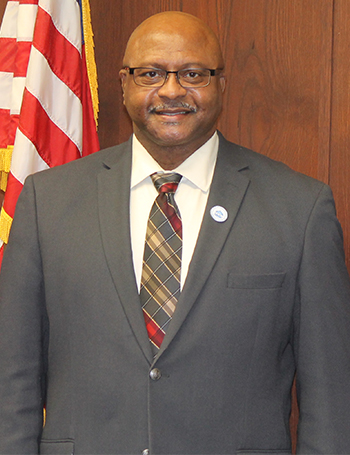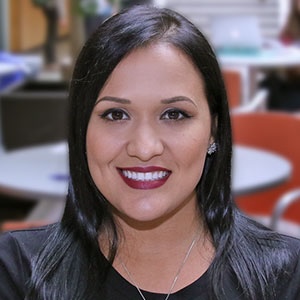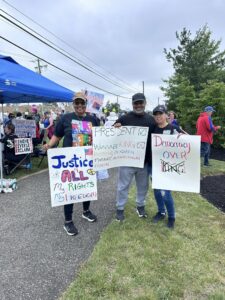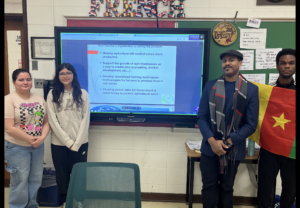South Jersey Face Vaccine Challenges in Communities of Color

This is part of the reporting fellowship on “Racial Disparities in the COVID-19 Vaccine Distribution” conducted by the Center for Cooperative Media for ethnic and community media in New Jersey.
By Clyde Hughes | AC JosepH Media
ATLANTIC CITY — Dr. Wilson Washington has a convincing story to tell when he confronts other African Americans who are hesitant to take one of the coronavirus vaccines — he has high blood pressure and did it, and here’s what’s going to happen:
Washington, Atlantic City’s health director, has hit the streets, gone on radio and has accepted virtually every speaking engagement he can say “yes” to in an effort to convince the city’s population — especially African Americans and Latinos — to take the vaccine.
New Jersey, like the rest of the country, has seen its Black and Latino communities suffer the brunt of the coronavirus pandemic. Those communities were disproportionately infected. But now with life-saving vaccines available, there is a hesitancy in those same communities to take it.
READ: Why I Serve — Shirley Irizarry
Part of the concern comes from historical distrust, particularly among Blacks, about medical mistreatment and long inequities in the health care industry. South Jersey has been particularly affected by this.
It’s the reason why Washington, with help from Mayor Marty Small Sr., have been aggressive in reaching out into the community.
“We’ve been trying everything we can to make sure we’re touching every footprint in the community,” Washington told Front Runner New Jersey. “I tell people if the opportunity avails itself to take the vaccine. Please take the vaccine if its offered.”
Hesitancy
Washington said he has spoken regularly on a weekly radio show sponsored by the NAACP, and has gone to local college campuses and engaged people one-on-one. He said in one instance, he told his personal story about taking the vaccine to a visually-impaired man who said he was afraid.
“I tell them you have every right to be concerned and to ask every question you want,” Washington said. He then went on acknowledge the history of African Americans in the medical community, how he handled side effects and education about the vaccine itself. He also breaks down the benefits of what is known in the medical community as “herd immunity.”
“I try to break it down,” Washington said. “The virus enters your body to kill you. It can only survive if it finds a host. If it can’t find a host, it simply dies.”
Washington admits, though, that the challenge of getting to herd immunity while overcoming historical hesitancy is an uphill battle. In the struggle to vaccinate Blacks and Latinos and South Jersey, the numbers continue to plague local and state health officials.
In Camden, the South Jersey county hardest hit by the pandemics with more than 41,300 cases and more than 1,100 deaths, 6% of all those receiving vaccines as of late this week have been Black and 5% Latino. This is despite the fact that Blacks make up 21% of the population in the county and Latinos comprise 17%.
In Atlantic County, Blacks make up 13% of the populations and Latinos make up 17%. Those numbers are much greater in Atlantic City, where Blacks and Latinos make up the majority of the population. Yet, as of Thursday, March 18, 6% of those receiving vaccinations so far are Black and another 6% are Latino.
Cumberland County, where Latinos make up more than a quarter of the population, is doing its best in vaccinating the Latin American community, with 12% of the population getting at least one shot. 8% of Blacks in Cumberland County have received a shot, also a statistical high. African Americans make up 18% of the population there.
Here are the statistics:
The Numbers
—
South Jersey Vaccinations vs. Black/Latino Populations
Vaccination statistics from New Jersey Department of Health
Population percentages from U.S. Census Bureau
As of Thursday, March 18
Atlantic County
- Black vaccinations 6%; population 13%
- Latino vaccinations 6%; population 17%
Burlington County
- Black vaccinations 5%; population 16%
- Latino vaccinations 3%; population 8.5%
Camden County
- Black vaccinations 6%; population 21%
- Latino vaccinations 5%; population 17%
Cape May County
- Black vaccinations 1%; population 3%
- Latino vaccinations 1%; population 17%
Cumberland County
- Black vaccinations 8%; population 18%
- Latino vaccinations 12%; population 27%
Gloucester County
- Black vaccinations 5%; population 10%
- Latino vaccinations 2%; population 6.4%
Salem County
- Black vaccinations 6%; population 12%
- Latino vaccinations 2%; population 7%
Note: Vaccination percentages are of those who have received at least one dose of the vaccine in each county. The population percentage is the portion of Blacks and Latinos that make up each county.
No South Jersey county has been hit harder than Camden County. As of Thursday, March 18, there has been 41,376 confirmed cases of the coronavirus with 1,116 confirmed deaths. Comparatively, Burlington County has had 32,721 cases and 716 deaths, followed by Gloucester County with 22,233 cases and 536 deaths.
Coronavirus Confirmed Cases and Deaths in South Jersey/Minority Populations
(As of Thursday, March 18)
Camden County: 41,375 cases; 1,116 deaths
Burlington County: 32,721 cases; 716 deaths
Gloucester County: 22,233 cases; 536 deaths
Atlantic County: 21,079 cases; 564 deaths
Cumberland County: 12,723 cases; 355 deaths
Salem County: 4,461 cases; 155 deaths
Cape May County: 3,928 cases; 161 deaths
Camden County Health Officer Dr. Paschal Nwabo said they have employed “community ambassadors,” community and neighborhood leaders to knock on doors and to reach into virtually block-by-block education about the value of taking the vaccine.
Nwabo said they have also leaned on faith-based communities in the county to assist with spreading the word. He said in November, they found about 29% of those in vulnerable communities were interested in taking the vaccine. Through its neighborhood outreach efforts, they have increased that number to just over 50%.
“We have a lot of ambassadors out there now,” Nwabo said. “If they are hearing [about the vaccine] from their pastors and people they trust and see, they are more inclined to accept the vaccine. We are aware of vaccine hesitancy in the community and how strong it can be.”
President Joe Biden has called for all locations to offer vaccines to everyone by May 1. Nwabo said getting the vaccine has been one of his biggest challenges, saying that Camden is prepared to vaccinate more if they can get their hands on the vaccine.
Washington said he experienced a slow start in Atlantic City as well, with Small pushing for more doses. Because of that effort, Atlantic City has gone from 400 doses at its mega-vaccination center at the Atlantic City Convention Center to more than 4,000 doses.
Washington and Nwabo encourage people with questions to go to their county websites or go to the health department. They said people there will be patient and willing to answer any questions and dispel misinformation about the vaccines.
Virtually all health outlets in South Jersey like AtlantiCare in Atlantic City, and the Kroc Center and BB&T Pavilion in Camden are involved in assisting vaccine distribution. There will also be pop-up clinics available as eligibility requirements continue to expand to the general population.
Follow Us Today On:
Note from AC JosepH Media: If you like this story and others posted on Front Runner New Jersey.com, lend us a hand so we can keep producing articles like these for New Jersey and the world to see. Click on SUPPORT FRNJ and make a contribution that will do directly in making more stories like this available. Thank you for reading.





